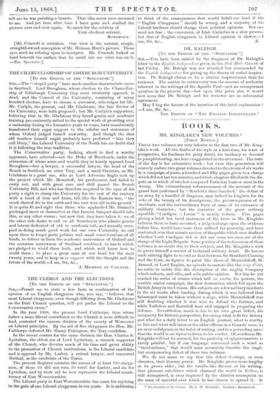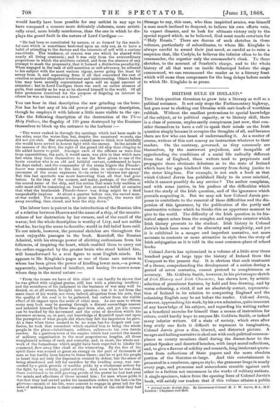BOOKS.
MR. KINGLAKE'S NEW VOLUMES.*
[FIRST NOTICE.]
THESE two volumes are very inferior to the first two of Mr. King- lake's work. All the faults of his style as a historian, his want of perspective, his fondness for petty detail, his tendency to descend to pamphleteering, are here exaggerated to the uttermost. The taste of the day is for exhaustive work ; but even this generation will scarcely endure two great volumes devoted to the events of six weeks in a campaign of years, a hundred and fifty pages given to a charge which did not last ten minutes, and whole chapters filled with the dis- pute as to which of two hot-tempered Earls was least or most in the wrong. The extraordinary voluminousness of the account of the grand feat performed by " Scarlett's three hundred," the defeat of an army by a handful of dragoons, may indeed be forgiven for the sake of the beauty of its descriptions, the picturesqueness of its incidents, and the extraordinary force of some of its estimates of military character ; but the narrative of the great military squabble "Cardigan v. Lucan " is merely tedious. Five pages giving a brief but lucid statement of the facts as Mr. Kinglake believes them to have occurred, a judge's charge upon the evidence before him, would have more than sufficed for posterity, and have contented even that minute section of the public which once doubted whether Lord Cardigan did or did not come too soon out of the charge of the Light Brigade. Some portion of the tediousness of these volumes is no doubt due to their subject, and Mr. Kinglake's wish to prove himself a master of technical military detail. He has no such stirring fight to record as that between Sir Stratford Canning and the Czar, no figures to paint like those of Mentschikoff, St." Arnaud, or Lord Raglan, no episode to narrate like the coup (fetal, no satire to indite like the description of the mighty Company which collects, and sifts, and sells public opinion. Nor has he yet reached the series of events which will so excite his powers, the terrible winter campaign, the slow destruction which fell upon the British Army in the Crimea. His subjects are a few military incidents in the six weeks after landing, during which it was believed that Sebastopol must be taken without a siege, while Mentschikoff was still doubting whether it was wise to defend the fortress, and while Todleben and Korniloff were still engaged in preparing the defence. Nevertheless, much is due to his own great defect, his incapacity for historic perspective, for seeing what is fit for history and what for a daily letter to an English journal, what is worthy to live and what will interest the older officers in a Guards' mess, to an over-indulgence in the habit of writing, and to a pervading sense that the world is on tiptoe to listeu to his verdict. Of wordiness Mr. Kinglake will not be accused, for the prolixity of epigrammatists is rarely painful ; but if our language contained such a word as " incideutiness," that would most accurately describe the single but overpowering defect of these two volumes.
We do not mean to say that this defect destroys, or even obscures, their literary power. Mr. Kinglake grows more lengthy as he grows older ; but the vanilla-like flavour of his writing, that pleasant sub-bitter which charmed the world in Eothen, is still unimpaired, is even improved by the dilution consequent on the mass of material over which he has chosen to spread it. It
• The invasion of the Crimea. By A. W. Kinglake. London : Blackwood.
would hardly have been possible for any satirist in any age to have composed a censure more delicately elaborate, more artisti- cally cruel, more briefly murderous, than the one in which he dis- plays the grand fault in the nature of Lord Cardigan :—
"He had been so constituted by nature, or so formed by the watch- ful care which is sometimes bestowed upon an only son, as to have a habit of attending to the desires and the interests of self with a curious exactitude. The tendency, of course, was one which he shared with nearly all living creatures ; and it was only from the extraordinary proportions in which the attribute existed, and from the absence of any attempt to mask the propensity, that it formed a distinctive peculiarity. When engaged in the task of self-assertion or self-advocacy, he adhered to his subject with the most curious rigour, never going the least bit astray from it, and separating from it all that concerned the rest of creation as matter altogether irrelevant and uninteresting. Others before him may have secretly concentrated upon self an equal amount of attention ; but in Lord Cardigan there was such an entire absence of guile, that exactly as he was so he showed himself to the world. Of all false pretences contrived for the purpose of feigning an interest in others he was as innocent as a horse."
You can hear in that description the saw grinding on the bone. Nor has he lost any of his old power of picturesque description, though he employs it with labour a little more visible to the eye. Take the following description of the destruction of the Three Holy Fathers, the flagship of 130 guns destroyed by the Russians themselves to block up the entrance to the harbour :— "The water rushed in through the openings which had been made in her sides, near the water-line, but, despite the unnatural wounds, she did not yet sink. Her steadfastness caused men to think how faithfully she would have served in honest fight with the enemy. In the minds of the seamen of the fleet, the sight of the grand old ship thus clinging to life added horror to grief. Amongst such of the officers as were free from superstitions, the pain, it would seem, was akin to that which men feel when they force themselves to see the blow given to one of the brute creation who is an old and faithful servant, condemned to have his days ended; and the commander of the steam frigate the Thunder- bearer was commanded to fire into her sides, in order—as the naval recounter of the scene expresses it—in order to shorten her agony.' But this last spectacle was more harrowing than all that had gone before. In the idea of the seamen, and many, perhaps, of the officers, the sacred name of the ship, and the notion that some holy emblem or relic must still be remaining on board her, aroused a belief or surmise that what the heathenish Thunder-bearer was doing might be a deed unspeakably impious. At about a quarter before one, the sacred man- of-war reeled. For a moment, so pions men thought, the waves fell away recoiling, then closed, and bore the ship down."
The labour here is patent in the introduction of the Russian idea of a relation between Heaven and the name of a ship, of the unnatu- ralness of her destruction by her owners, and of the recoil of the waves; but the whole description is worthy of Livy, and not unlike what he, having the scene to describe, would in full belief have said. To our minds, however, the personal sketches are throughout the most enjoyable passages in the book. Korniloff, the Russian Admiral, with his strange power of eliciting enthusiasm from his followers, of inspiring the heart, which enabled them to carry out the orders suggested by the greater brain who stood behind him, will henceforward be a real figure to most English minds. He appears in Mr. Kinglake's pages as one of those rare natures to whom has been given the power of kindling lower men,—a power, apparently, independent of intellect, and having its source some- where deep in the moral nature :—
"From the traces we have of this chief it can hardly be shown that he was gifted with original genius, still less with a piercing intellect ; and the soundness of his judgment in the business of war may well be denied, or, at all events, brought into question ; but it is not from the mere tenor of his words,-nor even, indeed, altogether from his acts, that the quality of his soul is to be gathered, but rather from the visible effect of its impact upon the souls of other men. As one man to whom many may look may be passing through a distant assemblage unseen and unheard himself by those who gaze from afar, and yet his course can be tracked by the movement and the cries of devotion which his presence arouses, so, in part, our knowledge of Korniloff must rest upon the perception of what people did when they felt the impulsion he gave. At a time when there seemed to be no room but for despair and con- fusion, he took that ascendant which enabled him to bring the whole people in the place—inhabitants, soldiers, sailors—to his own heroic resolve. In a garrison town of the empire which had carried the mania of military organization to the most preposterous lengths, all those straightened notions of rank and seniority, and, in short, the whole net- work of the formalisms which might have been expected to hinder his command, flew away like chaff at the winnowing. By the fire of his spirit there was roused so great an energy on the part of thousands of men as has hardly been known in these times ; and he so put his people in heart that not only the depression created by defeat, but the sense of being abandoned and left for sacrifice by the evading army, was suc- ceeded by a quick growth of warlike pride, by a wholesome ardour for the fight, by an orderly, joyful activity. And, even when he was dead, there continued to be still growing proofs of the power he had had over the minds and affections of those around him ; for men whose pride it was that they had served under his immediate orders in the last—in the glorious—month of his life, were content to engage in great toil for the sake of making known to their country the worth of the chief they had lost."
Strange to say, this man, who thus inspirited armies, was himself a man much inclined to despond, to believe his own efforts vain, to expect disaster, and to look for ultimate victory only to the special regard which, as he believed, God must needs entertain for "Holy Russia." There are dozens of such sketches in these volumes, particularly of subordinates, to whom Mr. Kinglake is always careful to award their just meed, so careful as to raise a suspicion that, like Carlyle, he believes the inferior often to be the commander, the superior only the commander's cloak. To these sketches, to the account of Scarlett's charge, and to the whole history of all that went on inside Sebastopol before the siege commenced, we can recommend the reader as to a literary feast which will more than compensate for the long delays before meals to which Mr. Kinglake is so prone.































 Previous page
Previous page